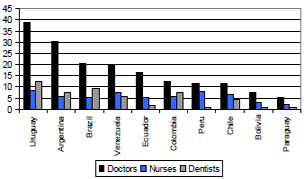Resource Spotlight: Health Worker Salaries and Benefits: Lessons from Bolivia, Peru and Chile

Many countries are met with obstacles to improving their health systems due to the problems regarding their health workers. These problems include an insufficient supply of workers, poor distribution of workers within the county, lack of needed workers in specific specialties, weak ministries of health and institutions in general relating to the health sector. There is also a problem of low morale among health workers, due to poor working conditions and low salaries, which are often lower than those of other professionals with similar levels of education and training. The combination of some or all of these problems leads to an inadequate supply of health care services. This study focuses on the issue of salary and benefits for health workers.
In this study, the authors analyze the behavior of health workers’ salaries in three Latin American countries: Bolivia, Chile, and Peru, based on empirical experience. The analysis for each country is detailed in a separate chapter. First, the study describes the heath system and the economic context of each country. Next it analyzes the salaries of the country’s health workers. Then it describes the incentives, the factors that affect the productivity of these workers, such as policies adopted by the three countries to recruit, retain, and motivate health workers. The general goal of this research was to offer useful policy-oriented information to health sector decision-makers by collecting information on the patterns and trends of health worker salaries and benefits and analyzing their determinants and impact in Chile, Peru, and Bolivia. [adapted from introduction]
View this resource.
The HRH Global Resource Center has other resources on this topic including:
- Drawing Remuneration of General Practitioners and Specialists in 14 OECD Countries: What are the Factors Influencing Variations across Countries?
- Salaries and Incomes of Health Workers in Sub-Saharan Africa
- How Should Doctors Be Paid? Lessons from Theory and Practice
For additional resources on this topic, visit the Salary subject category.
Past Resource Spotlights
- 5097 reads




